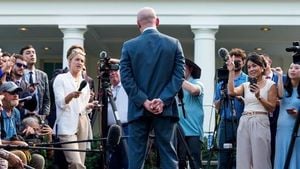On the morning of September 20, 2025, the political landscape in the United States was jolted by a single, cryptic social media post from California Governor Gavin Newsom’s press office. The message, directed at Department of Homeland Security (DHS) Secretary Kristi Noem, read, “Kristi Noem is going to have a bad day today. You’re welcome, America.” What followed was a swift and heated escalation, with reactions ricocheting from federal prosecutors to the White House, and from social media to the Secret Service itself.
Within hours, Bill Essayli, the acting U.S. Attorney for the Central District of California, took to X (formerly Twitter) to share the post and announce, “We have zero tolerance for direct or implicit threats against government officials. I’ve referred this matter to @SecretService and requested a full threat assessment.” His declaration underscored the seriousness with which the post was received by federal authorities, raising the stakes for what some saw as a political jab and others as a potential threat (according to The Independent and Fox News Digital).
The U.S. Secret Service confirmed receipt of the referral from the Department of Justice, stating, “To preserve operational integrity, we are not able to comment on specific protective intelligence matters. However, the U.S. Secret Service must vigorously investigate any situation or individual, regardless of position or status, that could pose or be perceived as posing a threat to any of our protectees. Especially in a politically charged climate, such as this.” This official response, reported by Fox News Digital, highlighted the agency’s commitment to investigating even perceived threats in today’s tense political environment.
Almost immediately, the post from Newsom’s office ignited a firestorm of criticism from prominent conservatives and Trump administration officials. Tricia McLaughlin, assistant secretary for public affairs at DHS, fired back on X: “This reads like a threat. This is ugly, @GavinNewsom. Your keyboard warrior team may hide behind their laptops and spew this kind of vitriol but you would never have the guts to say this to her face.” Her words, echoed by other officials, captured the sense of outrage and concern among many on the right (as reported by The Hill and Voz US).
Steven Cheung, White House Communications Director, went a step further, tying the timing of the post to the recent assassination of conservative activist Charlie Kirk. “To make a threat like this, especially on the memorial weekend for Charlie, is beyond the pale and totally disgusting. This is what happens when Gavin Newsom lets deranged Leftist lunatics post messages on his behalf,” Cheung wrote. His remarks were widely circulated and contributed to a growing chorus of voices decrying the tone and timing of Newsom’s press office.
Republican voices outside the Trump administration also joined in. Vivek Ramaswamy, a GOP gubernatorial candidate in Ohio, tweeted, “This isn’t what America needs right now, @GavinNewsom. Come on man. Do better.” Meanwhile, California Assemblywoman Kate Sanchez told Fox News Digital, “Our governor can’t keep his foot out of his mouth,” warning that such comments only increase the likelihood of future political violence.
The context for this digital skirmish was not merely rhetorical. The days leading up to Newsom’s tweet had been marked by tragedy: Charlie Kirk, a prominent conservative activist and founder of Turning Point USA, was shot and killed during an event at Utah Valley University. The killing, attributed to a man with a deep-seated grudge against Kirk’s views, shocked the nation and reignited debates over the rising tide of political violence in America. As Voz US noted, the murder “brought back to the center of the national debate the growing political violence that for years has been proliferating in the US, with assassination attempts and attacks against political figures of both parties.”
In the midst of this fraught atmosphere, Newsom’s press office doubled down. Hours after the initial post, they followed up with a press release touting a legislative package aimed at “protecting immigrant communities” and “holding Trump accountable.” According to the press release, the new laws were designed to “protect Californians, respond to federal overreach and push back against Trump and Stephen Miller’s ‘secret police’ tactics in California.” Among the bills signed that day was a measure prohibiting most law enforcement officers—including federal immigration agents—from wearing face coverings during official operations, with some exceptions. The Associated Press reported that the legislation was a direct response to the uptick in immigration raids under President Trump’s administration, which Newsom described as “like a dystopian sci-fi movie.”
At a press conference in Los Angeles, Newsom elaborated on the intent behind the legislative package: “We celebrate that diversity. It’s what makes California great. It’s what makes America great. It is under assault. This is the United States of America, and I’m really proud of the state of California and our state of mind that we’re pushing back against these authoritarian tendencies and actions of this administration.” He added, “Immigrants have rights, and we have the right to stand up and push back, and that’s what we’re doing here today.”
Federal officials, however, were not mollified. One DHS official called the new law “despicable” and warned it could put agents in danger, according to the Associated Press. Bill Essayli, for his part, asserted that he had “directed our federal agencies that the law signed today has no effect on our operations,” vowing, “Our agents will continue to protect their identities.” The practical enforceability of California’s new ban on face coverings for federal agents remains unclear, setting the stage for further legal and political clashes between state and federal authorities.
The controversy surrounding Newsom’s press office is not entirely new. In recent months, the office has gained notoriety for its combative social media presence, often parodying Trump’s online style with posts written in all-caps and signed off with the governor’s initials. Newsom himself has become one of Trump’s most vocal critics, especially following the deployment of National Guard troops to California cities without his approval and his subsequent lawsuits against the Trump administration for what he called “unlawful deployment.”
As the dust settled over the weekend, speculation swirled about Newsom’s political future. Term-limited, he cannot seek re-election in 2026 and is set to leave office in January 2027. Many observers, as noted by Politico and The Independent, believe he may be preparing for a presidential run in 2028—a possibility that only adds to the national attention on every move he makes and every word his office posts.
The events of September 20, 2025, serve as a stark reminder of the volatility of American politics in the digital age. A single tweet can trigger federal investigations, partisan outrage, and national debate—especially when it lands in the middle of a country still reeling from acts of violence and bitterly divided over questions of immigration, authority, and free speech. The reverberations from Newsom’s words, and the responses they provoked, are likely to echo well beyond the headlines of this weekend.






